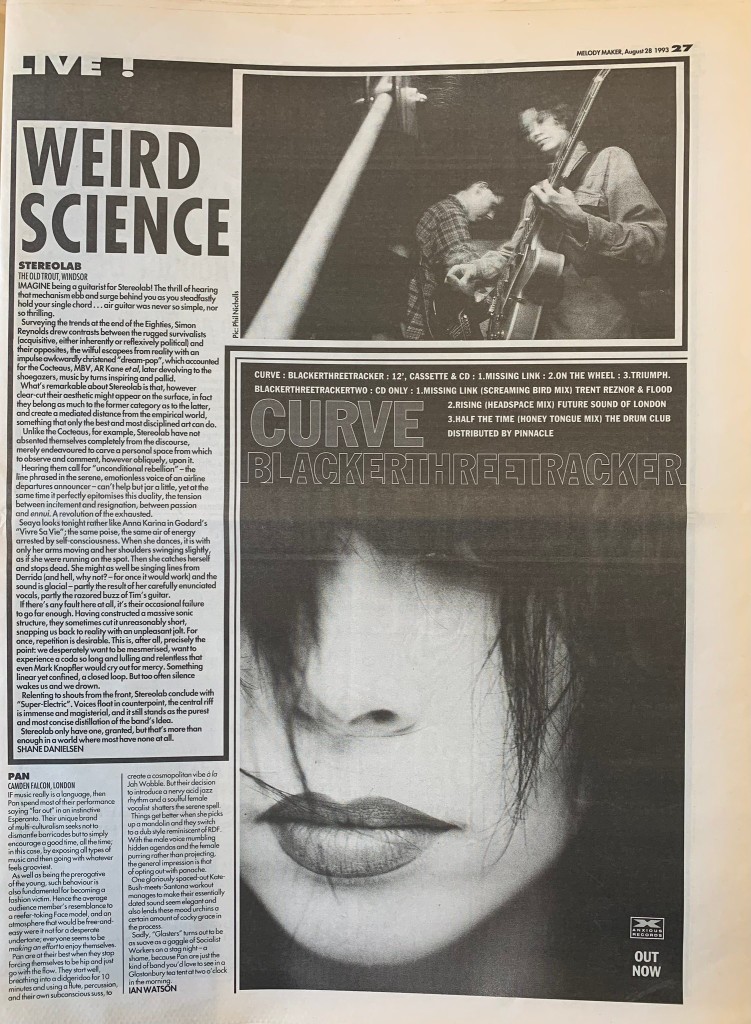Stereolab played The Old Trout, Windsor with Unrest July 28 1993, the show was reviewed by Shane Danielsen in the Melody Maker August 28 1993 issue.
I’ve transcribed the review –
STEREOLAB
THE OLD TROUT WINDSOR
IMAGINE being a guitarist for Stereolab! The thrill of hearing that mechanism ebb and surge behind you as you steadfastly hold your single chord…air guitar was never so simple, so thrilling.
Surveying the trends at the end of the eighties, Simon Reynolds drew contrasts between the rugged survivalists (acquisitive, either inherently or reflexively political) and their opposites, the wistful escapees from reality with an impulse awkwardly christened “dream-pop”, which accounted for Cocteaus, MBV, AR Kane et al, later devolving to shoegazers, music by turns inspriing and pallid.
What’s remarkable about Stereolab is that, however clear-cut their aesthetic might appear on the surface, in fact they belong as much to the former category as to the latter, and create a mediated distance from the empirical world, something that only the best and most disciplined art can do.
Unlike the Cocteaus, for example, Stereolab have not absented themselves completely from the discourse, merely endeavoured to carve out a personal space from which to observe and comment, however obliquley, upon it. Hearing them call for “unconditional rebellion” – the line phrased in the serene, emotionless voice of an airline departure announcer – can’t help but jar a little, yet at the same time it perfectly epitomises this duality, the tension between incitement and resignation, between passion and ennui. A revolution of the exhausted.
Seaya looks tonight rather like Anna Karina in Godard’s “Vivre Sa Vie”; the same poise, the same air of energy arrested by self-consciousness. When she dances, it is with only her arms moving and her shoulders swinging slightly, as if she were running on the spot. Then she catches herself and stops dead. She might as well be singing lines from Derrida (and hell, why not? – for once it would work) and the sound is glacial – partly the result of her carefully enunciated vocals, partly the razored buzz of Tim’s guitar.
If there’s any fault here at all, it’s their occasional failure to go far enough. Having constructed a massive sonic structure, they sometimes cut it unreasonably short, snapping us back to reality with an unpleasant jolt. For once, repetition is desirable. This is, after all, precisely the point; we desperatley want to be mesmerised, want to experience a coda so long and lulling and relentless that even Mark Knopfler would cry out for mercy. Something linear yet confined, a closed loop. But too often silence wakes us and we drown.
Relenting to shouts from the front, Stereolab conclude with “Super-Electric”. Voices float in counterpoint, the central riff is immense and magisterial, and it still stands as the purest and concise distillation of the band’s Idea. Stereolab only have one, granted, but that’s more than enough in a world where most have none at all.

Leave a comment